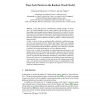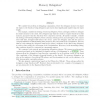2967 search results - page 496 / 594 » Cryptology |
CRYPTO
2011
Springer
13 years 9 months ago
2011
Springer
Abstract. A time-lock puzzle is a mechanism for sending messages “to the future”. The sender publishes a puzzle whose solution is the message to be sent, thus hiding it until e...
CRYPTO
2011
Springer
13 years 9 months ago
2011
Springer
Deterministic public-key encryption, introduced by Bellare, Boldyreva, and O’Neill (CRYPTO ’07), provides an alternative to randomized public-key encryption in various scenari...
CRYPTO
2011
Springer
13 years 9 months ago
2011
Springer
Secure computation enables mutually suspicious parties to compute a joint function of their private inputs while providing strong security guarantees. Amongst other things, even i...
CRYPTO
2011
Springer
13 years 9 months ago
2011
Springer
We consider the problem of delegating computation, where the delegator doesn’t even know the input to the function being delegated, and runs in time significantly smaller than ...
112
click to vote
CRYPTO
2011
Springer
13 years 9 months ago
2011
Springer
In CRYPTO 1997, Canetti et al.put forward the intruiging notion of deniable encryption, which (informally) allows a sender and/or receiver, having already performed some encrypted...


